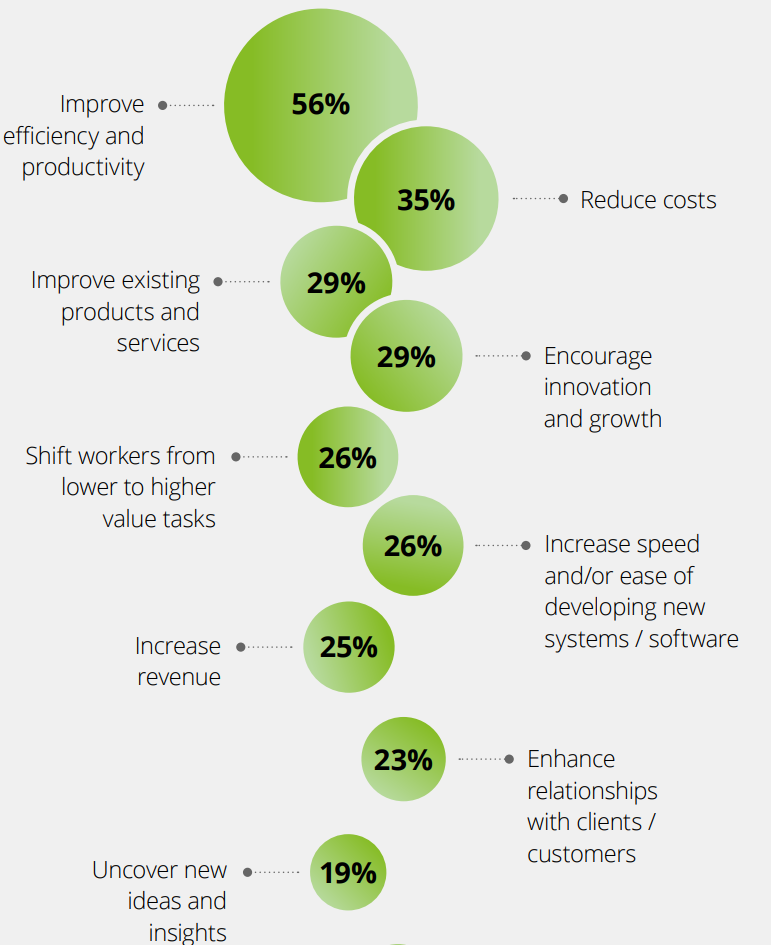Get the newest insights
Let us know your interests and get the most relevant reports, articles and events delivered straight to your inbox!
Sign up here
The global excitement about generative AI (GenAI) remains high, but most current GenAI efforts focus on efficiency and cost reduction rather than innovation and growth. CEOs should keep their fingers on the pulse of adoption.

According to 2,800 global business and technology leaders, excitement about generative AI remains high, and transformative impacts are expected.
Organisations that report very high expertise in GenAI tend to feel more positive about it but also feel more pressure to adopt it quickly.
Ultimately it is up to the CEO to make sure that GenAI efforts are not just focused on cost reduction, but also on radical innovation and growth.
The term “unprecedented” is often thrown around when talking about business and technology. However, in describing the pace of generative AI’s emergence and popularity, unprecedented could be an understatement.
The first pulse of Deloitte’s new Generative AI quarterly survey was completed in December 2023 and included more than 2,800 business and technology leaders directly involved in piloting or implementing GenAI at major organisations around the world.
And hopes are high at this moment: The vast majority of respondents (79 per cent) said they expect GenAI to drive substantial transformation within their organisation and industry over the next three years.
The survey results also suggest that many AI-fuelled organisations are on the verge of scaling up their efforts and embracing GenAI in a more substantial way. This aligns with what we’re seeing in the marketplace, where organisations around the world are racing to move from experimentation and proofs-of-concept to larger-scale deployments.
The GenAI fever is certainly omnipresent, but as with all promising technologies, leaders are also concerned about falling behind the competition as brand-new business models threaten to replace old ones.
Interestingly, our survey shows that relative to other respondents, leaders who rated their organisation’s overall GenAI expertise as “very high” also tend to feel much more pressure to adopt it and see it as a threat to their business and operating models.
As new competitors try to harness the disruptive power of GenAI, existing organisations will need to work hard to maintain a competitive advantage. Pursuing easy opportunities and quick wins might be smart at first, but not to the exclusion of more strategic and bold opportunities.
For CEOs now is the time to get familiar with the GenAI game and lay the ground for future success.
A good place for CEOs to start is the fact that only 29 per cent of today’s organisations report targeting strategic benefits such as innovation and growth – while more than half report improvements in productivity and efficiency based on GenAI.
Certainly, productivity and efficiency are important; however, the greatest value of GenAI will undoubtedly come from using the technology to innovate. First, by helping to generate new products, services and capabilities that would not be possible otherwise. And, second, by enabling new business models and ways of working across an enterprise.

CEOs, especially, will need to spearhead the kind of innovative, transformative and pioneering can-do mindset that could ultimately be the difference between long-term success and failure.
No matter how you look at GenAI, it certainly represents disruption and opportunity across industries. Everywhere, CEOs and their teams are exploring how GenAI can be used to unlock business value, supercharge efficiency and productivity, and open the door to entirely new products, services and business models. For any CEO, now is the time to keep one’s finger on the pulse of adoption.
If you are interested in learning more about AI-driven business transformation, you can follow the Deloitte AI Institute. You can also download the full GenAI report “The state of Generative AI in the enterprise: Now decides next” here.
Let us know your interests and get the most relevant reports, articles and events delivered straight to your inbox!
Sign up here